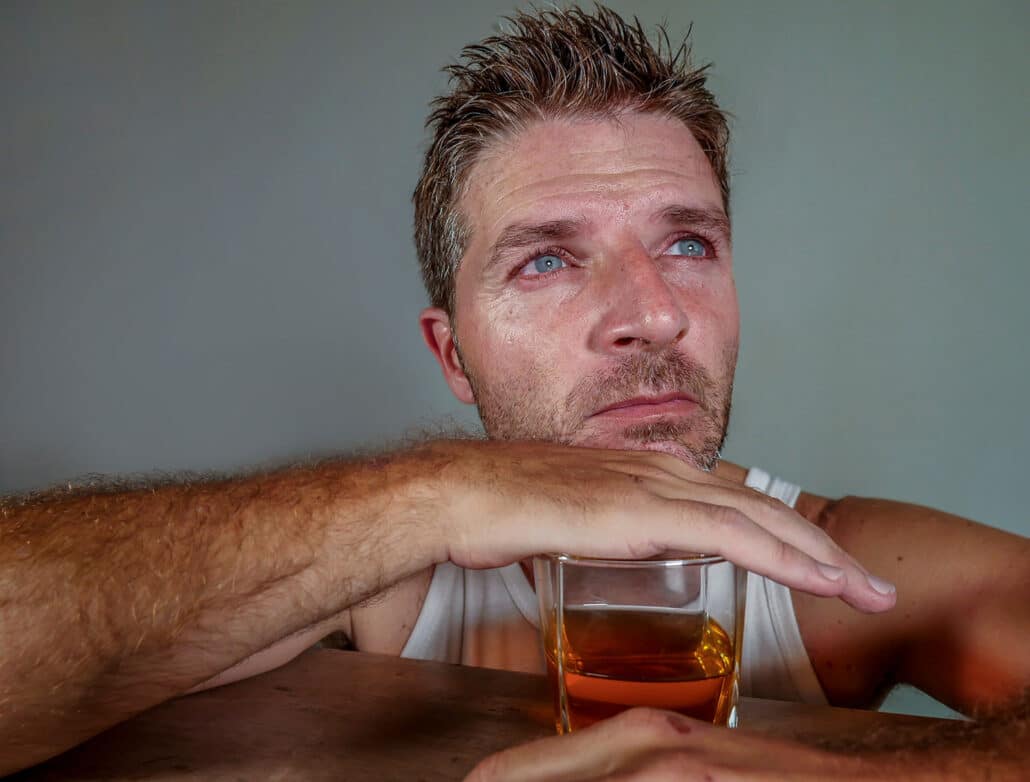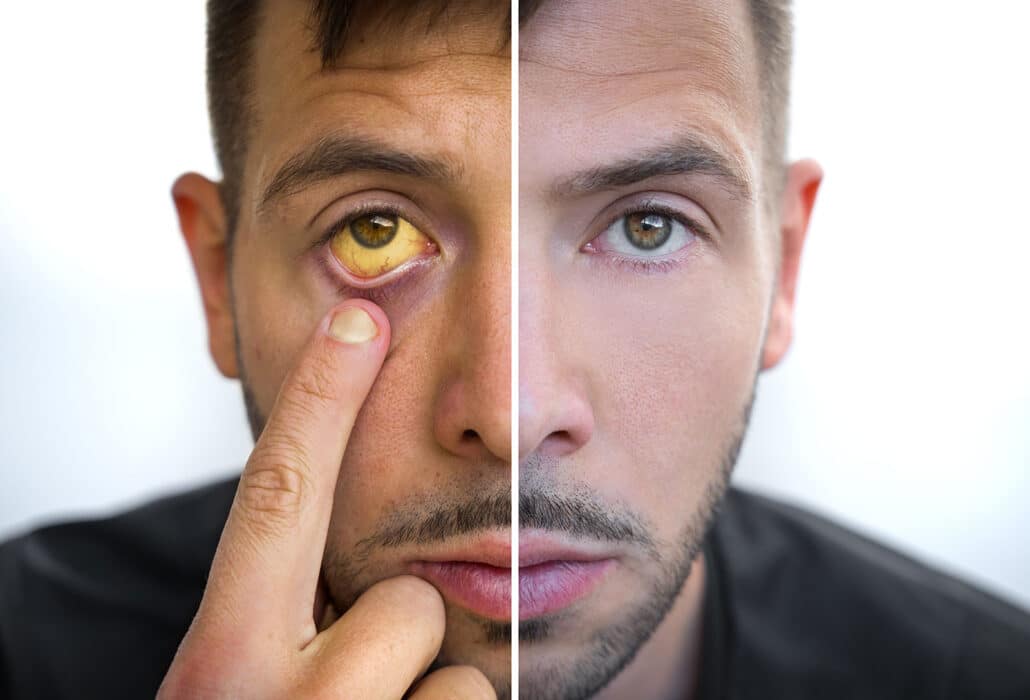If you know what to look for, you may be able to tell if someone is an alcoholic person or suffering from alcohol addiction just by looking at their eyes. Those who are dependent on alcohol and into heavy drinking or have a habit of excessive drinking will often have eyes that are puffy, eye dryness or dry eyes, swollen, bloodshot eyes, or red eyes. In some cases, an alcoholic’s eyes will be yellow or otherwise discolored. Let’s take a closer look at why this happens, the multiple ways that alcohol can cause loss of vision, and how long-term alcohol abuse can cause negative effects on your overall physical and mental health, such as acquiring alcohol use disorder, increased risks of alcohol affects, and even the different healthcare on alcohol addiction treatment programs.

Table of Contents
An Overview of Alcoholic Eyes
Your eyes will become swollen or bloodshot because alcohol causes the blood vessels in that part of your body to swell. If you are constantly drinking alcohol, those vessels are under constant attack and don’t have time to return to their normal state. In addition, alcohol will cause you to become dehydrated, which means that your eyes may become dry, itchy, and irritated. This can also cause them to appear red and swollen.
Alcohol Can Cause Lasting Vision Damage
In addition to causing blood vessels around the eyes to swell, alcohol can also cause damage to the optic nerves in your eyes. These nerves are responsible for relaying information to your brain that helps you make sense of your environment. If these nerves are damaged in any way, you may develop blurred vision or partial blindness. In the event that you continue to drink, it’s possible that you can go completely blind due to alcohol abuse.
Of course, you may still experience a number of issues that could interfere with your quality of life even if you retain your vision. For example, you may have bouts of double vision, have sensitivity to light or experience rapid eye movement while you’re awake. While rapid eye movements are normal while you’re asleep, such movement while you are conscious may be a sign of brain damage.
It’s critical to understand that you can’t do much to restore your vision after it has been lost. Instead, you will either have to adjust to your new reality or hope that advances in technology will make it easier to navigate the world around you. If you are experiencing vision loss, you may be eligible for a guide animal or workplace accommodations that allow you to do your job despite your limitations.
How Alcohol Can Impact Your Short-Term Health
Your eyes are not the only part of your body that is impacted by alcohol, and in some cases, taking even a single drink can lead to negative health consequences. For instance, after a single drink, you start to lose your inhibitions, which is why you tend to be more social or more willing to take risks.
Typically, after about four drinks, you start to lose control over major muscle groups. You also struggle to process information and may also be less likely to feel physical pain. This partially explains why you can take a punch or fall on the floor and not be in pain until the following morning.
If your blood alcohol content gets above .20%, you could have trouble breathing or fall into a coma. In the event that your binge drinking episode doesn’t kill you, it may still result in a significant hangover that can last for hours.
It’s important to note that binge drinking can be dangerous even if you don’t consider yourself to be an alcoholic. Binge drinking is generally defined as four or more drinks within two hours, and it can cause longer-term damage to your liver and other organs. Therefore, having a few beers at the bar or a couple shots of whiskey on Saturday night with your friends can cause health issues even if you don’t drink the rest of the week.

The Long-Term Effects of Alcoholism
Generally speaking, a night out at the bar will cause little more than dehydration and sending regrettable text messages to your boss. However, if you drink to the point of impairment every night, you could run the risk of significant health issues.
For instance, your liver could develop scarring so severe that it will no longer function properly. This can result in jaundice, which is the yellowing of the eyes, as well as chronic pain. You may also develop blood pressure issues or other secondary health problems.
If caught early enough, cirrhosis of the liver can be managed. However, even so, there is a possibility that you could die as the liver won’t be able to efficiently filter out toxins or otherwise clean your blood as it circulates through the body.
You may also suffer a condition called neuropathy that is caused by damage to nerve endings in the hands and feet. Depending on how severe your condition is, you may be able to walk over shards of glass or other objects without feeling any pain at all. While this may seem like a positive thing, pain is what tells the body that something is wrong.
Mental Health Issues Related to Alcohol Abuse
There are a number of mental health issues that are caused by alcohol abuse, such as an inability to sleep or get restful sleep. You may also suffer from hallucinations or feel ornery if you go more than a few hours without a drink. This is generally true even if you present to others as a functional alcoholic.
An inability to sleep is typically caused by the fact that the brain essentially shuts down when you consume too much alcohol. In essence, you are closer to being comatose than being truly asleep when you’re drunk. Therefore, you won’t get the rapid eye movement (REM) sleep that helps to restore you overnight.
In some cases, the lack of sleep can result in visual or auditory hallucinations as your body is simply too tired to function properly. It can also result in changes in mood and behavior independent of your alcohol dependence.
However, it’s well known that taking away something that the body has come to expect will result in negative consequences. Therefore, if you don’t stop for a drink first thing in the morning, it’s most likely withdrawal that is making you ornery and not just fatigued.
You may also feel anxious or nervous if you can’t drink on a regular basis. This may partially be because you know what happens if you stay away from the booze for too long. In addition, you may also worry that you won’t be able to deal with the stress of your personal or professional lives without help from beer or liquor.
How to Overcome the Damage Already Done to Your Body
If you stop drinking early enough, it may be possible to overcome the damage done to your body with some simple lifestyle changes. For instance, minor vision damage might be mitigated by getting glasses and avoiding staring at screens for too long. You may also talk to your doctor about taking vitamins or eating foods such as nuts, certain types of fish, and leafy greens that can promote eye health.
Compression socks or sleeves can help with neuropathy or circulation issues related to excessive alcohol consumption. In addition to easing pain, you may find it easier to regulate your body temperature by improving circulation.
Working with a therapist may help to overcome the mental health issues related to alcohol use. This may be especially true if your dependence was caused by ADHD, a traumatic relationship, or some other trigger. In addition to talking about what ails you, medication may make it easier to keep your brain and body calm throughout the day.
Finally, be sure to get plenty of water, sunlight, and rest each day. Staying hydrated can prevent eye, liver, and other organ damage. Getting sunlight each day can help to improve your mood, which may reduce your urge to drink. Ideally, you will sleep at least seven hours a night to stay mentally sharp at work or during social events.
In addition to working with a therapist, you may want to consider enrolling in an outpatient group therapy program. Meetings are often held at churches or community centers and are available to anyone who wants to talk or simply listen to what others have to say.
If you or a loved one is struggling with alcohol dependence, the folks at Long Island Interventions are here to help. We offer a number of treatment programs that are tailored to your needs and budget. You can get in touch with us through our website at any time to learn more about your options or how to get started today.
Published on: 2023-12-29
Updated on: 2025-06-05

